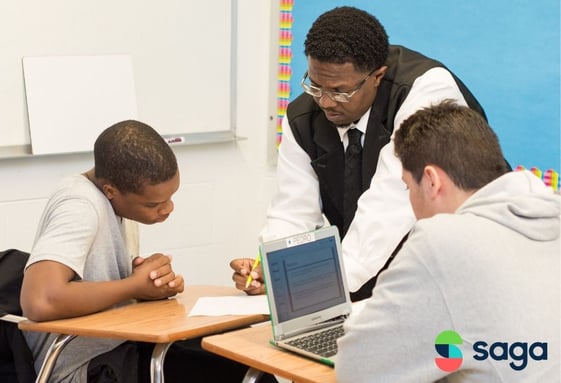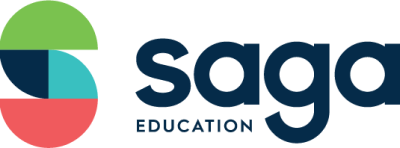In order to advance Saga’s mission to make education more equitable for Black, Brown, and low-income students, strategies to develop the most effective and yet scalable model are constantly in the works.

A few years back, Saga initiated its first test pilot of our Blended Learning Model, a new tutoring model that integrates technology-based learning with Saga’s personalized, tutor-driven tutorials. Students participating in the Blended Learning program spend half of their time in a small group with their tutor and the other half working on an adaptive learning platform working on tutor-selected and artificial-intelligence-(AI)-driven activities and lessons.
This year, students use one of two adaptive learning platforms, ALEKS and Khan Academy:
ALEKS: a platform that creates a student-tailored learning path correlating with the results of a baseline assessment and uses AI to update and adapt based on the student’s performance throughout the lessons.
Khan Academy: a similar platform that offers a range of content, but unlike ALEKS, is not self-adaptive; it must be manually tailored to the needs of each individual student by the tutors themselves.
While both ALEKS and Khan Academy have perks, Saga decided to launch a Blended Learning Adaptive Practice pilot in search of a platform that best suits the needs of our students, Fellows, and organization as a whole by striking a balance between adaptiveness and cost. Without compromising the growth of the student, if Saga can find the most cost-effective tutoring model, school districts would be more accessible with a higher chance of federal funds covering the program increasing our opportunity to expand to impact more students.
We surveyed 1,284 students and staff to collect feedback on the most important platform features to prioritize in our research assuring that those who would be using the platform regularly had a say in which platforms Saga would explore. After gathering that data, Saga’s Manager of Instructional Technology, Denise Parham-Gantt, researched platforms that could be tested.
When exploring the variety of math platforms, Saga considered several questions
-
Did the platform have the right content?
-
Did it provide appropriate data feedback to help advance the student?
-
Were the tutorials informative?
-
Did the platform engage the students?
In the end, Saga selected Intro to Math Space, MATHia, and Knowre Math:
-
Mathspace’s adaptive learning technology provides highly individualized learning paths for each student. Students can show their work and get scaffolded hints and video lessons as they work. Mathspace provides an interactive, standards-aligned textbook, augmented with videos, investigations, and hands-on mathematics software that brings together geometry, algebra, spreadsheets, graphing, statistics, and calculus.
-
Knowre’s algorithmically generated curricula provides each student with content targeted at filling their unique learning gaps. Its Walk Me Through feature provides students instructional help through videos and step-by-step guidance at each step of a problem. Knowre’s gamified feedback and vibrant graphics are intended to motivate students to engage with learning.
-
MATHia uses sophisticated AI technology to adapt to student performance at a detailed, skill-by-skill level. MATHia personalizes learning and seeks to engage students with customized just-in-time feedback and contextual hints. MATHia prompts students to take ownership of their learning by visually displaying their progress toward multiple skills.
As of the month of February, Saga has begun piloting these platforms at six different sites. Saga will collect data to conduct comparative analyses of the platforms and of ALEKS and Khan Academy. Ultimately, at the end of this pilot and after consulting with Program Leaders, Denise will make a recommendation regarding the adaptive practice tool that Saga should use going forward and the insight collected will be used to inform the development of a Saga-built and -owned adaptive practice platform.
Stay tuned to learn about our findings from our blended learning adaptive practice pilot study!
